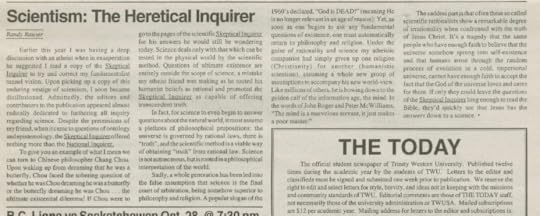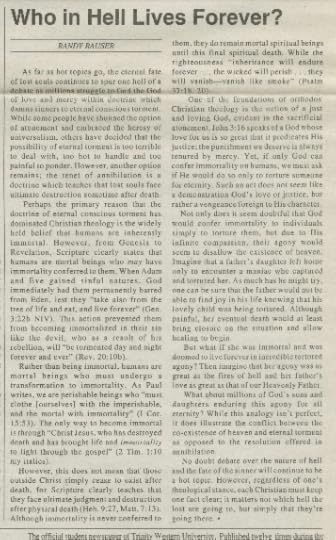Randal Rauser's Blog, page 152
May 30, 2016
If atheists are offended by a theodicy, does that give them a right to be rude?
In my interview “God and the Problem of Suffering: An Interview with Paul Buller” Paul provides a brief summary of his theodicy according to which God allows at least some evil as a means by which moral agents can acquire moral virtue.
The article prompted a long comment from The Atheist Missionary (TAM) which concluded as follows:
“Without a hint of sarcasm or condescension, I would like to thank both Randal and Mr. Buller for this interview. It reminds me of why I despise the theology underpinning Christianity. I realize that my reaction in no way affects whether that theology is true. However, if it is true, your deity can … [insert whatever blasphemous insult you please].”
TAM states not merely that he disagrees with “the theology underpinning Christianity”, but that he despises it. And he concludes by expressing his unmitigated disgust with a choose-your-own blasphemy for the deity in question.
At first blush, this response is incoherent. If God exists and this theodicy is true, then God has morally sufficient reasons to allow the evils that occur. And there is no act more irrational than cursing the most perfect being for acting in accord with morally sufficient reasons so as to maximize the good. This leads me to conclude that the most charitable interpretation of TAM’s insult is that it is directed not ultimately at God but rather at the theodicist him/herself. In other words, TAM concludes his comment of utter disdain by cursing the theologian who endorses such a position.
After I challenged him on the vitriol of this comment TAM replied as follows:
“I admittedly get fired up when Christian apologists try to justify what I consider to be incomprehensible and unjustifiable suffering as part of some greater plan. It’s my pet peeve and I’m sorry for my over the top tone.”
This is less an apology as admission of wrong doing and more an apology in the classic Greek sense (apologia = defense). And that is what intrigues me about this whole exchange and makes it worth discussing here. You see, time and again I’ve encountered atheists/skeptics who believed that their personal disagreement with specific Christian theodicies provided them with some kind of moral license to be aggressive, vulgar, and uncivil.
It doesn’t.
To drive the point home, I pointed out to TAM that Christians have deep personal distaste for many particular secular philosophies which are every bit the equivalent of TAM’s personal distaste for theodicy. I noted as an example Peter Singer’s utilitarian ethics with its concomitant implications for practices like infanticide and bestiality.
But as much as Christians might disagree with Peter Singer’s utilitarian ethics, this offers no excuse to react to those who defend it with inflammatory language and insults. If we begin to give ourselves license to curse and insult those with whom we disagree, we might as well give up on the very idea of a marketplace of ideas altogether.
If Christians are not justified in cursing and insulting atheists because they have a personal disagreement with and distaste for a particular secular philosophy, then neither are atheists justified in engaging in like manner because of a personal disagreement with and distaste for their personal Christian apologetic “pet peeve”.
May 29, 2016
The complex ethical problem of the Mega-Church
The other day I had an interesting conversation with a friend who pastors a mid-sized church (approximately 400 congregants) in a major city in North America. I asked him about the impact that a new mega-church in that city has had on surrounding churches. By any conventional measure this church is a “success”. It has exploded from nothing to 3000 weekly attendees in just a few years driven by energetic music teams, aggressive marketing, and a charismatic, if brash head pastor.
So it was interesting (if unsurprising) to learn that that much of this growth has come by way of siphoning congregants off surrounding churches. My friend, who keeps close contact with other pastors in the area, relayed a series of anecdotal reports: “Approximately 200 people from this church have left for the mega-church. Twenty percent of that church’s youth group no longer attends. This church has laid off two staff members as a result of the drop in attendance.” One congregant even told his pastor: “Maybe we’d start growing if you preached more like Pastor X!”
My friend recently attended a meeting of local pastors from the city in which the pastor of this new mega-church was invited to speak, apparently under the pretense of offering inspiration to the very pastors whose churches had lost members to the upstart phenom. How’s that for a cruel irony? During the Q&A my friend asked the rock star pastor about the elephant in the room: how was he dealing with the problem that he was drawing congregants from other churches? His response was, shall we say, rather brusque: If other churches can’t adapt to a shifting marketplace then they deserve to lose their members.
I couldn’t help but note the parallels with Walmart. According to one stat, on average 23 small businesses close when Walmart moves into a new town. But the church isn’t Walmart, and Christianity is not merely selling a product in a competitive religious marketplace.
May 28, 2016
TWU Today Archives Part 4: A Plea Against Evangelical Kitsch
My journey through the TWU Today Newspaper archives continues as I consider another article I wrote waaay back in ninety-six. This one must have been good because as I recall, it prompted my friend Steve to write an indignant letter to the editor in reply.
The article includes standard buzzwords of the evangelical lexicon in the 1990s — “the Lost” and “pseudo-Christian cults” and “New Agers” — but it also raises some legitimate concerns about the use of bumper stickers — and kitsch culture generally — as a means to propagate the Gospel. As Marshall McLuhan said, the medium is the message, and a bumper sticker simply is not a great medium for meaningful communication. Is this really the way we want to bring the Gospel to the world?
As I observe in the article: “While the Jews believed that God’s name was too sacred to utter, we’ve saturated our culture with phrases like ‘Jesus saves’ or ‘God is love’ until they’ve become meaningless cliches.”

May 26, 2016
God and the Problem of Suffering: An Interview with Paul Buller

Paul Buller
In this interview I discuss that most difficult of problems, God and suffering, with Christian apologist Paul Buller. Paul is a co-founder of the Network of Christian Apologists in Calgary, AB and the author of the book Suffering: The Heart of the Matter.
But while Paul loves to pursue the intellectual side of Christian faith, his perspective on suffering is also informed by a family crisis. Read on to discover the trials Paul and his family have faced and how he has processed those experiences and reconciled them to the concept of a perfectly powerful and loving God.
* * *
Randal: Paul, thanks for joining me in this conversation on your book Suffering: The Heart of the Matter. Quite often authors get asked “Why’d you write this book?” In your case, your interest in this enduring topic is not merely abstract or theoretical. Rather, it is rooted in the suffering you’ve experienced in your own life. Can you share something of your own story that motivated you to write this book?
Paul: Absolutely. Since before we were married, my wife (Denise) and I knew she had issues with her heart. Her issues were the kind that put her at an elevated risk of cardiac arrest, but she faithfully took her meds and saw her cardiac specialist once or twice a year. We even managed to have two children without any major happening with her heart.
But on April 16, 2013, late in the morning, that all changed. She had a full blown cardiac arrest while at school (she’s an elementary school teacher). Fortunately she was between classes; I cannot imagine how that would have impacted her students. Unfortunately for her, she was alone when it happened. And there was no AED in the school.
As far as we can tell she was found fairly quickly by her colleagues. They called 9-1-1 and began CPR. Between their efforts, the first responders, and the ER medical staff it took a total of about 73 minutes to get her heart running properly on its own again. She was put in a medically induced coma and her body temperature was cooled in an effort to minimize the neurological damage from the reduced air flow to her brain.
Those days when she was unconscious gave all of us a lot of time to think about a lot of things. With so many risks, the very real possibility remained that I was going to plan a funeral before this was all done. If not a funeral, perhaps she would end up with permanent and catastrophic brain damage. The possibility of a full recovery almost seemed too good to be true.
I had informally studied Christian Apologetics for many years prior to the event, and the “problem of suffering” had obviously crossed my radar. I had some general theoretical knowledge about the subject, but it was quite something else to live it out instead of merely reading about it in books and maybe debating friends on the subject. Oddly, my conceptual knowledge of the subject gave me a strange sense of peace during that time. Although the book is not intended to directly bring comfort to the reader (I say so in the introduction) my hope is that the reader will carry with them a different perspective on the subject, so the next time they are faced with suffering they will respond to it differently.
Randal: You say that your conceptual knowledge of the field of apologetics provided a sense of peace. I suspect many folks will be surprised at that. Can you unpack that a bit?
Paul: That may be due in part to my personality type – I’m pretty analytical by nature (I became an engineer… surprise, surprise) – but I believe it also relates to something in the human nature that perhaps we have lost sight of. I think of Mark 12:30 where Jesus said we need to “love God” but he didn’t leave it at that. He clarified what that looked like. He spelled it out. We are to love him with our “heart, soul, mind and strength.” He had a holistic view of humanity in mind, and part of that holistic view is the intellect. Because he set that out as a general command clearly he didn’t just have the analytics like me in mind; he was talking to everybody. We are all intellectuals.
And that really points to the integrated nature of humanity. We are inherently intellectual, even if we don’t think of ourselves as such. Our conceptual understanding of reality is deeply connected to our emotional response to reality, which is deeply connected to how we conduct ourselves within reality. And so on. They all interact with, and inform, each other. If you take any one of those out then the whole thing becomes a little less stable. Build them all up and your life is on much surer footing. The fact that I had spent some time intellectually considered the problem of suffering gave me a reasonably solid footing in the intellectual domain of life, and that provided stability for the emotional, the spiritual, and the social dynamics of the situation.
The problem with the intellectual is that it comes across as cold and calculating, so many people are put off by that. In one sense it is, which is why I put that disclaimer right at the beginning of the introduction, but in another sense – from a more long-term perspective – it produces peace in a most unexpected way. When difficulties “make sense” in very general terms then it’s somewhat easier to walk through whatever particular “valley of the shadow of death” you are enduring at the moment. Suffering never loses its sting, of course, but we become able to see beyond the suffering.
The intellect certainly is not the be all and end all of what it means to be human, but we ignore it to our peril. If we haven’t thought about these matters then tragedy will rock us to our very core when it strikes.
And it will strike, eventually. You can count on that.
Randal: How is your wife doing now?
Paul: As close to a complete recovery as you can get. She has ongoing heart issues, of course, but the medical treatment she received – and continues to receive – gave me my wife back. And it gave our kids their mom back. She’s back to teaching and we are going on a cross-Canada road trip this summer because she loves to travel.
The big question mark in the hospital was brain damage, but none of us can detect any residual effects of any kind.
That’s as close as you can get to “complete recovery” considering her heart stuff is genetic and isn’t going to go away.
Randal: Good to hear!
So back to the question of suffering itself, can you give me the potted version of your perspective on this age-old conundrum? Why do you believe God allows his creatures to suffer? And feel free to weave in your own personal reflections on your experience as you offer your explanation.
Paul: One thing that really struck me during the entire episode was the dedication and self-sacrifice of first responders and the medical staff who brought her back from the brink of death and restored her to her family and her life. I had a chance to meet the paramedics and firemen who responded to her call after she began recovering. When we met they thanked me for taking the time to bring them up to speed.
They thanked me?! They saved my wife’s life; shouldn’t it be the other way around?
I learned from the fireman in charge that day that he had been on the force for 30 years and Denise’s arrest was the third one with a happy ending. When first responders get called to a cardiac arrest they are almost always going to watch somebody die. Day in and day out they have to deal with these issues, which is why PTSD is a fairly common issue they deal with. A similar observation applies to the ER staff, and other medical staff in the entire process. But then my thinking went beyond just my family’s experience. How many other self-sacrificial roles are there out there? Police. Soldiers. The list grows.
And so grows our admiration. There is something about these heroes that resonates with our deepest and most noble ambitions. We admire these men and women of honour, and we ought to.
But here’s the kicker; in a world without suffering they would all be out of work. In a world without cardiac arrests and other health disasters there would be no need for paramedics. In a world without car accidents and burning houses there would be no firemen. All that nobility inevitably disappears along with the suffering. In a world without all this unpleasantness we would have no opportunity to attain to the virtuous potential God instilled in each of us. There is no need for knights in shining armour if there are no damsels in distress, no fire-breathing dragons.
A world without suffering would necessarily be a world without nobility, honour, courage, virtue and much that gives the human experience depth, significance and richness. We would all be alive and safe, yes, but I would argue we would unavoidably fall far short of the great potential we possess.Suffering exists so that we have the potential to become the kind of humans God wants us to be. And, frankly, the kind of humans we also ought to desire to be; self-sacrificial men and women of great honour and virtue.
Of course that raises a long list of objections and questions (Should we then maximize suffering? What about the New Earth? Animals? etc) and I try to work through most of the key issues in the book.
Randal: Nicely stated. I certainly agree with your intuitions that the pursuit of second order goods like courage and altruism and kindness provides at least part of the story for why God allows suffering.
That said, let me raise an objection. Imagine a woman who surreptitiously sets fires so that her firefighter husband and his colleagues may have an occasion to develop their firefighting skills and cultivate the virtues of good and brave people. Despite her allegedly noble intentions, we would decry her actions as morally indefensible. Doesn’t your picture present God acting in like manner, essentially setting fires only so we can put them out?

Fort McMurray Fire
Paul: This may come as a bit of a surprise to readers, but I happen to know that firemen regularly do set fires so that they can practice extinguishing them. In the summertime in Calgary it’s a common sight to see tires set ablaze at the airport so that the airport fire fighters have an opportunity to learn the skills involved in extinguishing real fires (and develop the courage to face them down; heat, fear and all).
The setting of fires for the purpose of skill and character building is not an inherently bad thing. But we need to ask about the kind of fires, where they are set, collateral damage, and so forth. Setting tires ablaze in a controlled manner at the airport is one thing, setting your neighbour’s garage ablaze is something else entirely. If the purpose is to build skills, then the collateral damage to your neighbour’s property does not justify setting their garage on fire when a controlled fire at the airport would accomplish the same purposes for the firefighters, but without the unnecessary collateral damage.
Which brings us back to God and his culpability. While nobody is justified in setting your neighbour’s garage on fire, God might just allow it to burn when he could have prevented it. Heck, he allowed a good chunk of Fort McMurray to burn! So the question becomes whether he could have achieved the same ends (nobility, courage, etc) through a different means. If Fort Mac never burned could his same purposes with respect to virtue growth have been accomplished by some other means?
In theory, yes, they could have! But not without some fire to something valuable, somewhere. If Fort Mac didn’t burn, something else would have and we would be complaining about why God let that happen.
The lady setting fires does not need to do that because the same purposes could have been accomplished through other means. God’s predicament is essentially that he does not have any other means. It is not logically possible to develop virtue in a world devoid of suffering, like fires (or so I am persuaded). Thus if God is limited only to that which is logically possible, then if he wanted his creation to have the opportunity to develop virtue, this world necessarily needed to include the occasional uncontrolled fire that damages people’s property.
And if people object that, “surely an omnipotent God could find another way,” then the burden of proof is on them to tell me about this “plan B” that they have in mind. Tell me about this possible world that is devoid of fires, but retains the nobility of fire fighters as we see them in our world.
I’m very interested…
Randal: I want to hone in on your statement that “It is not logically possible to develop virtue in a world devoid of suffering…” Let me offer two responses by way of reply.
So let’s begin with my first response. Even if one grants the premise, one could reply that it is possible to develop those same virtues in a world with less suffering than we do, in fact, find. For example, according to reports approximately 1600 buildings were destroyed in the Fort Mac fire. But couldn’t God have achieved the same development in virtue in his creatures with 1599 buildings burned? And if he could have, doesn’t that make the 1600th building burning wholly gratuitous? And why would God allow gratuitous evil?
Paul: I’m not sure he could have. Consider the virtue of perseverance, for instance. Inherent in that virtue is the necessity that one must endure something difficult over an extended period of time. And the longer the unpleasantness, the greater the potential for the virtue of perseverance to develop. There is great “perseverance potential” (if we can call it that) in fighting 1,599 fires, but there is (I would argue) infinitesimally more potential if the total number is 1,600 instead of 1,599. There is, actually, a difference; albeit a small one. And one cannot develop the same level of perseverance by fighting 1,599 fires that one could theoretically develop by fighting 1,600. If the purpose of suffering is to afford the opportunity for virtue development then no suffering is gratuitous, by definition.
[I do argue in my book that there is a point of diminishing returns, and that God has wisely avoided that point in our present world.]
I’d like to make two other points along the same lines. First, we must not miss the burnt forest through the charred trees. Are we really squabbling about 1 house out of 1,600? Most of God’s critics that I’ve interacted with will say things like, “if even one child suffers…” or “if even one woman is raped…” then God has not done his job. Nobody would seriously be satisfied with 1,599 instead of 1,600; the problem of suffering wouldn’t go away. We would start asking why he didn’t stop it at 1,598.
And I know this because of my second point. As much as we might question why God didn’t stop the fires at 1,599 houses why aren’t we thanking him that he prevented 1,601 houses from burning? We can shake our fists at God when somebody we love dies, but did we thank God every morning that they woke up alive? That really hit home for me when I nearly lost my wife. I question God over the suffering when I almost lose a loved one, but I so easily take her (and my kids, family and friends) for granted when all is “as it should be.” If we are going to curse God at the bad things in life we must praise him for all the good in life, and if we lived that out, then I am convinced we would spend vastly more of our time singing praises than shouting curses.
Randal: Nicely stated. So let me progress to my second question. You refer to the development of virtue. Granted, that might require suffering. But what’s the big deal with acquiring virtue? Why couldn’t God simply infuse virtue into his creatures?
Look at it this way. In scenario 1 we have 100 courageous firefighters who became courageous by fighting the Fort Mac fire. In scenario 2 we have 100 courageous firefighters to whom God immediately infused the virtue of courage without a single building burned in Fort Mac. What is it about the first scenario that makes the acquired virtue of courage in 100 firefighters worth the cost of 1600 buildings, to say nothing of the untold human misery that comes with it?

Moral Virtues
Paul: It is my view that virtue cannot be infused. It must be attained. I liken it to the thought experiment about the scientist (was her name Mary?) who sees the color red for the first time, despite already knowing absolutely everything there is to know, conceptually, about the color red, vision, eyes, brains, neurons and all that. The act of personally experiencing red is somehow qualitatively different than mere knowledge about the subject.
Similarly, a person needs to actually run toward a burning building when their every impulse says to run away before they actually attain courage. It is the act itself that is the virtue, in a manner of speaking. It is the act of courage that inspires epic tales, grand poems and drama that moves us as humans because we recognize the magnificence of those acts. Merely possessing the potential to exercise a virtue isn’t nearly as impressive. When’s the last time you went to a movie about a firefighter who possessed the virtue of courage but was never given the opportunity to actually run into a burning building?
Besides, let’s run the thought experiment a little further, shall we? Suppose God created a world where he infused every person with courage and then withheld any possible instance where courage might be needed. What’s the point of that? That would be like Canada offering aid to Haiti by providing thousands of free parkas and snowblowers. Sure the Haitians might have the potential to grapple with winter, but without the need to actually grapple with winter, the generosity of Canadians is kind of pointless. Similarly, virtue is kind of pointless in a world where virtue is unnecessary.
And such a world is what I describe in the short story in the middle of the book. If I may engage in just a moment of shameless self-promotion and self-congratulation, I’ve been told by a number of readers that the short story imagining a “perfect world” is quite engrossing as it systematically peels away various features of our world that we think we would like to get rid of. And where the protagonist ends up… well it certainly isn’t what he had in mind.
Randal: I’m intrigued!
However, I do need to ask you: does this mean that you think Jesus was lacking in virtue? Or did he need to acquire virtue like the rest of us by “running into a burning building”?
Paul: Therein I believe lies one of the mysteries that isn’t so easy to resolve. It occurred to me once that if Adam and Eve had never sinned, and neither had any human since them, God would have had no opportunity to extend mercy. Does that mean he would never have been merciful, or does that merely mean that he possessed the virtue of mercy but lacked opportunity to express it? I cannot say that I have an answer. Hebrews 5, around verses 8 and 9, seems to suggest that Jesus did some learning, and was somehow “made perfect” as though it was a process. I’m not into process theology, but those are data points that need to be included in our understanding.
Though I don’t have an answer, I do believe there may be some insight relating to the reality that God and humans have many similarities, but are obviously in fundamentally different categories. We are told to “be perfect, as your heavenly father is perfect” which points to the fact that perfection, for us, needs some prompting whereas perfection, for God, is inherent. We have life, God is life. We learn to love, God is love.
But that certainly seems inconsistent with what I said before about the impossibility of infusing virtue, except that nobody would have infused virtue into God. He would be the standard by which virtue is measured.
Still, what does it mean for God to “be merciful” prior to Creation? I cannot say I have an answer. I certainly don’t think I have exhaustively treated the subject in the book but hopefully I’ve covered enough ground that the average reader can engage the material and feel a little more prepared next time life hands the lemons. Mystery remains, undoubtedly, but hopefully it’s a mystery that is somewhat less perplexing, and hopefully the reader will find that suffering is somewhat more meaningful.
And, with any luck, the reader might even seize the opportunity to become a little more human – a little more Christ-like – in the process of life in this world.
* * *
You can learn more about Paul’s book, Suffering: The Heart of the Matter, here.
May 25, 2016
A plea for a greener evangelicalism
Some years ago I published an article in Faith Today Magazine in which I noted that I support two charities: World Vision and the World Wildlife Fund. And I observed that when I would share this fact with fellow Christians, everybody lauded my support for World Vision. By contrast, when I mentioned my support for the World Wildlife Fund, the response would more often than not be a confused or judgmental look. The message was clear: “How dare you give thirty bucks a month to pandas and polar bears when you could support another World Vision child!” The irony is that those same people would never bat an eye if I spent that thirty bucks to take my wife out for dinner. So dinner on the town is okay, but saving pandas is not?
I take up similar themes in my new article published at “Unfundamentalist Christians” titled: “For God So Loved the Whole World: Confessions of a green, liberal, Christian tree hugger.”
May 24, 2016
TWU Today Archives Part 3: My first apologetics article ever in which I demolish scientism! (Not really.)
In this installment of my dive into the TWU Today newspaper archives I have my first apologetics article ever! Published on October 10, 1995, it’s a critique of the skeptic community’s uncritical acceptance of scientism. My proximate target is Skeptical Inquirer, a publication of CSI (originally CSICOP).
The first thing you can see (if you can read the tiny font) is that I use big words like “epistemology” and “ontology”. I definitely wear my new found learning on my sleeve.
Second, while I allegedly critique Skeptical Inquirer, I give no evidence that I’ve actually read the magazine. Clearly it’s nothing more here than a cipher, a sort of punching bag for my broad and protean criticisms of “scientism”.
Third, there is a smarmy, superior tone that lacks any nuance and fails to find any good in Skeptical Inquirer. And had I actually read the magazine (I suspect I didn’t; if I did, it was without charity) I would have found much to admire and much with which I could agree.
Perhaps I shouldn’t be too hard on myself. I meant well (more or less) and I do offer some cautionary criticisms of a facile acceptance of scientism. Nonetheless, after reading this I still want to give my 1995 self a good cuff on the ear.

May 23, 2016
Confession: A Sermon
In this sermon, delivered at Greenfield Community Church in Edmonton, AB in May 2016, I speak on the topic of confession for sin.
http://randalrauser.com/wp-content/uploads/2016/05/WCT05-Confession.mp3
Why John Sanders won the Unbelievable Debate on Open Theism and Heresy
The most recent episode of “Unbelievable” featured a debate between open theist John Sanders and Calvinist James White. All in all it was a good exchange, although White tended to offer potted criticisms of open theism and I found Sanders had an effective reply to many of his points. All in all a very worthwhile primer to the open theist debate.
The Low Blows
Both debaters occasionally retreated to rhetorical debating strategy. For example, at one point Sanders raised an important point when he asserted that God’s original prophecy of the destruction of Tyre (Ezek 26) was not fulfilled as originally uttered, and so God revised it in Ezek. 29:17-20. In his reply, White observed that usually he hears this passage being mentioned by atheists and Jehovah’s Witnesses. Needless to say, Sanders was not happy that White opted to lead with “guilt by association” rather than a direct treatment of the text and its implications for divine foreknowledge.
As for Sanders, he took his rhetorical indulgence when it came to meticulous providence and evil. As he sees it, Calvinists believe God “wants” women raped and he “wants” children sexually abused and he “wants” murder and mayhem. Sanders then observed that he shares the sentiment of John Wesley: “if that’s love, it makes my blood run cold.”
I have two points in response to Sanders here. First, Sanders is a very intelligent theologian, so he surely knows that this is a misrepresentation of the views of Calvinists. Calvinists believe in a double decree which includes both that which God wishes to occur and that which God wills to occur. God does not wish any evil to occur: he does not “want” any rape to occur. Nonetheless, God does will that evils occur. As a result, if Sanders wants to launch a viable objection at this point, he wouldn’t collapse the two wills and play off the ambiguity. Rather, he would challenge the coherence of two wills.
Second, White could have turned this back on Sanders by pointing out that on Sanders’ view God could have prevented the rape (or whatever other evil) at any moment, but instead, God stood by watching the horror unfold in the name of protecting the perpetrator’s free will. And this sets up Sanders for an ironic rejoinder: “If that’s love, it makes my blood run cold.”
(I suspect the lesson here is that no theology emerges from the problem of evil unscathed.)
By the way, White was very good when it came to the pastoral benefits of a theology of meticulous providence and evil as he emphasized that his theology was forged in the fires of a hospital chaplaincy: this ain’t just ivory tower stuff.
Why John Sanders won this debate
Thus far my assessment is that the episode featured a good exchange between two well matched opponents with the occasional dalliance into rhetorical debating strategy. So you might reasonably conclude that the debate was a draw. So why do I believe that Sanders won this debate?
Remember that the question under debate is this: “Is Open Theism a heresy?” White was allegedly arguing that it is, while Sanders was arguing that it isn’t.
To make his case, Sanders effectively located open theism within the wider Christian tradition as a minority position in the history of the church. And he supplemented this picture with a credible interpretation of several biblical passages in support of open theism while offering counter-interpretations to several “problem passages” like Isaiah 40-48 and Jesus’ prophecy of Judas’ downfall.
This left the burden of proof on James White to define “heresy”, defend his chosen definition, and then demonstrate how open theism satisfies that chosen definition. But he didn’t even try to do that. He offered no formal definition of heresy. Instead, his approach to heresy seemed to parallel Justice Potter Stewart’s famous definition of “obscenity”: “I know it when I see it.” But that’s not good enough for a debate.
Sadly, conservative Christians frequently throw around the term “heresy” as some kind of trump card of strong censure on positions they disagree with. For example, I recently spoke at a church conference about the topic of homosexuality and the church. One pastor on the panel described the position of gay affirming Christians as “heresy”. But he offered no definition of heresy to justify this assertion.
As a theologian of considerable learning, James White should know that he can’t just throw around terms like “heresy” without justifying them. The most he did in this debate was to claim that the Bible teaches a Calvinist theology.
But there were two problems with that position. The first is that Sanders provided evidence that the Bible underdetermines (and thus does not teach) a Calvinist theology. Second, even if White is correct, it doesn’t follow that open theism is heresy. (For example, one could argue that the Bible establishes the norm of believer’s baptism. It doesn’t follow that pedobaptism is heresy.) So even if White had established that the Bible teaches Calvinism, he still would not have met his burden of proof.
In sum, while James White offered some grounds to believe open theism is false, he utterly failed to establish that it is heresy. And for that reason, John Sanders wins this debate.
If you’re interested in further reflection on the topic of heresy, I highly recommend Dale Tuggy’s podcast episode “Heretic! Four Approaches to Dropping H-Bombs“.
May 22, 2016
TWU Today Archives Part 2: A Defense of Annihilationism
This article, published in the TWU Today Newspaper on January 23, 1996, represents one of my first forays into theological writing. Provocatively titled “Who in hell lives forever?”, the article provides a succinct summary and defense of the case for annihilationism, the doctrine that the reprobate cease to exist in hell.

May 21, 2016
TWU Today Archives Part 1: The Bike Shed Blunder
I attended Trinity Western University from 1993-1996. During that time I wrote articles for the student newspaper, the TWU Today. And lo and behold, this evening I discovered that all my handiwork is available in an online archive!
With that in mind, I’ve decided to post a modest series honoring my introduction to writing and publishing twenty years ago. But I’ve decided to begin the series not with an article I wrote, but rather with a trauma I lived through. In March 1995 my cherished motorcycle, a gorgeous ebony black and chrome 1994 Suzuki Intruder, was parked in TWU’s nondescript bike-shed when a delivery truck backed into the structure, sending it toppling down on the bikes contained therein … including my beloved Intruder.
This article on the front page of the March 1995 TWU Today immortalizes the so-called “Bike Shed Blunder” and the fate of my beloved ride. (Not to worry, the Intruder was restored to showroom condition and I continued to ride it until I moved to England in 1999.)





